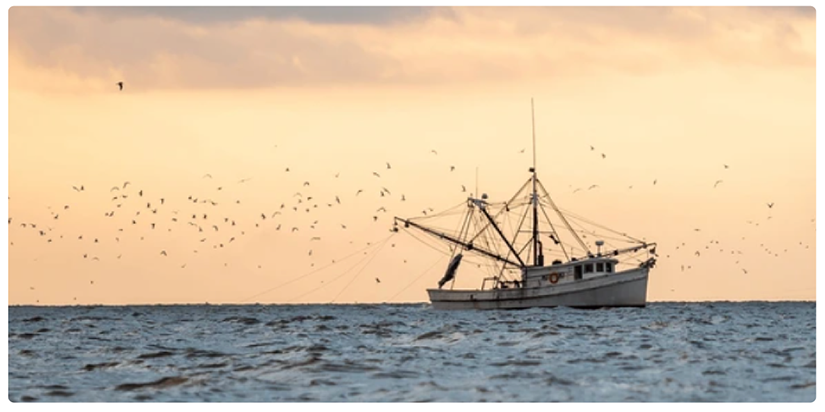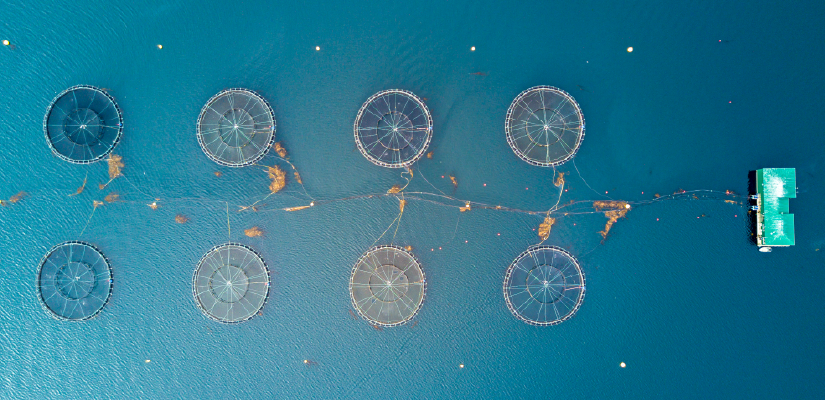
Akvakultur i EU
Den Europæiske Unions (EU's) fælles fiskeripolitik definerer akvakultur som "opdræt eller dyrkning af akvatiske organismer ved hjælp af teknikker, der har til formål at øge produktionen af de pågældende organismer ud over miljøets naturlige kapacitet, hvor organismerne forbliver en fysisk eller juridisk persons ejendom i hele opdræts- og dyrkningsfasen, til og med høsten".
Akvakultur er en af de hurtigst voksende fødevareproduktionssektorer i verden og er en stadig vigtigere bidragyder til den globale fødevareforsyning og økonomiske vækst.
I Europa spiller akvakultur en afgørende rolle for den socioøkonomiske udvikling af kyst- og flodområder og for bevarelsen af den maritime flod- og fiskekultur. I 2020 nåede EU's akvakultursektor op på 1,2 mio. ton i salgsmængde og 3.9 mia. EUR i omsætning og beskæftigede direkte ca. 57 personer i ca. 14 virksomheder. Disse er primært mikrovirksomheder og små virksomheder og er ofte familieejede (STECF 24-14).
Retsgrundlaget for EU's akvakulturpolitik ligger i den fælles fiskeripolitik fra 2013, som har til formål at støtte væksten i EU's akvakultursektor og samtidig sikre dens økonomiske, miljømæssige og sociale bæredygtighed for at give EU-borgerne en kilde til sunde fødevarer og bidrage til fødevaresikkerheden. Artikel 34, "Fremme af bæredygtig akvakultur", fastlægger en åben koordinationsmetode mellem medlemsstaterne baseret på Kommissionens strategiske retningslinjer for en mere bæredygtig og konkurrencedygtig akvakultur i EU (vedtaget første gang i 2013 og revideret i 2021).
Disse retningslinjer udgør den centrale søjle i den strategiske koordinering af akvakulturpolitikken i Unionen og har til formål at opbygge en EU-akvakultursektor, der er konkurrencedygtig og modstandsdygtig; deltager i den grønne omstilling sikrer social accept og forbrugeroplysning øger viden og innovation. På grundlag heraf er medlemsstaterne blevet anmodet om at revidere deres flerårige nationale strategiplaner for akvakultur, hvor de skal fastlægge deres planer, mål og passende foranstaltninger til fremme og udvikling af bæredygtig akvakultur på deres område. Offentliggjorte MNSP'er, herunder et resumé på engelsk, kan findes under afsnittet Landeoplysninger på AAM's websted.
Gennemførelsen af de strategiske retningslinjer og de flerårige nationale strategiplaner støttes af midler, der stilles til rådighed i Den Europæiske Hav- og Fiskerifond (EHFAF), som løber fra 2021 til 2027. Andre EU-finansieringsprogrammer såsom Horisont Europa eller BlueInvest II finansierer også akvakulturrelateret forskning og projekter.
Læs mere om EU's akvakultursektor på følgende links:
- Kommissionens Generaldirektorat for Maritime Anliggender og Fiskeri (GD MARE)
- Den Videnskabelige, Tekniske og Økonomiske Komité for Fiskeri (STECF) — EU Aquaculture Sector — Economic Report 2024 (STECF 24-14)

EU's bistandsmekanisme for akvakultur
EU's bistandsmekanisme for akvakultur (AAM) har til formål at støtte medlemsstaterne, akvakulturindustrien og andre relevante interessenter i gennemførelsen af de strategiske retningslinjer for en mere bæredygtig og konkurrencedygtig akvakultur i EU for 2021-2030 gennem levering af logistisk, administrativ og teknisk bistand samt en kvikskranke for viden og praksis om bæredygtig akvakultur i EU.
Bistandsmekanismen er en del af en tjenesteydelseskontrakt, der forvaltes i fællesskab af Det Europæiske Forvaltningsorgan for Klima, Infrastruktur og Miljø (CINEA) og GD MARE. Konsortiet koordineres af NTT DATA, Poseidon, SCOPE — Netcompany, European Aquaculture Society (EAS) og Den EuropæiskeAkvakulturteknologi- og Innovationsplatform. Tjenesteydelseskontrakten trådte i kraft i juli 2024 og løber indtil juni 2026.
Målsætninger
AAM giver Europa-Kommissionen og EU-medlemsstaterne logistisk, teknisk og administrativ støtte til gennemførelsen af de nye strategiske retningslinjer.
Mere specifikt er flere mål afgørende for, at EU's AAM kan nå sit endelige mål:
- Indsamling og udveksling af viden, god praksis, fremme af relevante arrangementer, formidling af nyheder og andre oplysninger om bæredygtig akvakultur i EU.
- Yde teknisk ekspertise om bæredygtig akvakultur ved at støtte Kommissionen i at udarbejde vejledninger og baggrundsdokumenter om forskellige aspekter af akvakulturpolitikken
- Udvikling af uddannelses- og e-læringsværktøjer vedrørende disse vejledninger og baggrundspapirer
- Besvarelse af spørgsmål fra medlemsstater og interessenter om de vejledninger, der er udarbejdet
- Tilrettelægge arrangementer, workshopper, konferencer, uddannelse og tekniske møder rettet mod EU's medlemsstater, akvakulturindustrien og andre interessenter for at støtte gennemførelsen af EU's strategiske retningslinjer for akvakultur.
Læs mere:
Der oprettes EU-referencecentre for dyrevelfærd (fastsat i forordningen om offentlig kontrol, der blev vedtaget i marts 2017, og som harmoniserer EU-reglerne om offentlig kontrol i hele fødevarekæden) for at bistå EU-medlemsstaterne med deres offentlige kontrol af dyrevelfærdsregler på bedrifter, under transport og på slagte- eller aflivningstidspunktet.
Den Europæiske Unions referencecenter for velfærd for akvatiske dyr (EURCAW-Aqua), der blev oprettet i januar 2024, blev oprettet i overensstemmelse med Europa-Parlamentets og Rådets forordning (EU) 2017/625 og vil støtte Europa-Kommissionens og medlemsstaternes aktiviteter ved at gennemføre videnskabelige og tekniske undersøgelser samt gennemføre uddannelseskurser og formidle forskningsresultater og information om tekniske innovationer, navnlig med fokus på fisks, blæksprutters og henfalds velfærd.
Opdrættede akvatiske arter af økonomisk betydning for europæisk akvakultur vil blive prioriteret. EURCAW-Aqua er struktureret med henblik på at tackle de største udfordringer i forbindelse med vurderingen af akvatiske organismers velfærd, nemlig det store antal opdrættede arter, mangfoldigheden af produktionssystemer og forskellige vandmiljøer.
EURCAW-Aqua vil gennemføre og lette forskningen i det underudviklede område for akvatiske dyrs velfærd og engagere sig i offentlighedens opsøgende arbejde og bevidsthed.
EURCAW-Aquas arbejde vil støtte de mål for vanddyrs velfærd, der er indeholdt i de strategiske retningslinjer for en bæredygtig europæisk akvakultur.
Det europæiske partnerskab om dyresundhed og dyrevelfærd (EUP AHW) er et samfinansieret europæisk partnerskab for forskning og innovation, der er oprettet på initiativ af Kommissionen med henblik på at bekæmpe smitsomme sygdomme hos dyr, herunder akvatiske dyr, og fremme dyrevelfærd.
Partnerskabet, der blev lanceret i 2024, forventes at investere 360 mio. EUR over syv år for at fremme forskning og lette samarbejdet mellem alle aktører.
Partnerskabet har til formål at styrke samarbejdet på tværs af sektorer og gennem en One Health- og One Welfare tilgang at skabe samfundsmæssige virkninger.
Målene for EU's handlingsplan for bæredygtig udvikling er i overensstemmelse med den europæiske grønne pagt og den dertil knyttede jord til bord-strategi for et fair, sundt og miljøvenligt fødevaresystem.
Partnerskabet om energiomstilling for EU's fiskeri og akvakultur (ETP) er en samarbejdsplatform, der har til formål at fremskynde energiomstillingen i de europæiske fiskeri- og akvakultursektorer.
ETP, der blev lanceret af Europa-Kommissionen i 2023, tackler tekniske, finansielle og lovgivningsmæssige hindringer ved at samle interessenter med henblik på at skabe praktiske og gennemførlige løsninger.
Medlemskab af partnerskabet er åbent for interessenter i hele akvakultur- og fiskerisektoren. Det er hensigten med partnerskabet, at deltagerne gennem tematiske dialoger og workshopper beskæftiger sig med centrale områder såsom innovation, teknologi, færdigheder og finansiering.
Resultaterne af disse aktiviteter vil bidrage til udviklingen af en (frivillig) køreplan med målbare kort-, mellem- og langsigtede milepæle sammen med konkrete tiltag med det formål at vejlede sektoren i retning af klimaneutralitet senest i 2050.
ETP fungerer som et knudepunkt for udveksling af viden, fremvisning af bedste praksis og fremhævelse af innovative projekter, der støtter energiomstillingen.
Desuden har ETP en ETP-støttegruppe, hvor ETP-interessenter kan samarbejde om at drøfte udfordringer, udforske strategiske tilgange og bidrage til at forme sektorens fremtid.
